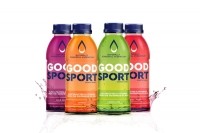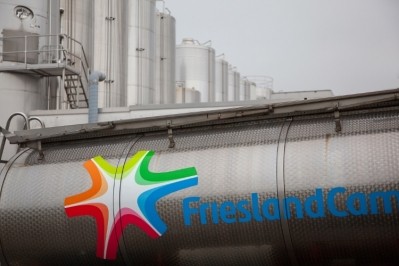Dairy Dialog podcast 123: FrieslandCampina, GoodSport, Warrens

We also have our weekly look at the global dairy markets with Liam Fenton at StoneX.
Zeelandia and FrieslandCampina partner on cheesecake
Bakery solutions experts Zeelandia and FrieslandCampina have joined forces to craft an accessible alternative to the New York cheesecake.
Having ‘cracked the code’ of the traditional cheesecake together, the companies have introduced The New Cheesecake, based on whey protein.
Zeelandia’s crust mix is topped with FrieslandCampina’s fresh cream cheese in a straightforward recipe with a ready-to-use ingredients mix. The result is a cheesecake that is also guaranteed to banish the surface cracking that is the bane of bakers’ lives.
“There are several qualities of cheesecakes on the market in Europe and Asia, with different types of cheese, but the biggest increase in demand is for real American premium cheesecake. Consumers look for the real thing! Bakers desire truly indulgent sophisticated pastry applications. So far, no alternative has been able to match or surpass American cheesecake quality,” said Eelco van Oosterbosch, global category leader at the Royal Zeelandia Group.
The companies said The New Cheesecake is also a more sustainable option. Rather than shipping the finished product frozen, The New Cheesecake uses local ingredients and production, and a newly created supply chain in which the baker creates the cheesecake. This helps to reduce the carbon footprint.
“Together with the professionals from FrieslandCampina, we are proud to introduce The New Cheesecake. It is proven to be as creamy, smooth and satisfying as the original, offering an indulgent cheesecake experience with an optimal sensory balance between delightfully sweet and fresh sour notes, a rich and creamy consistency, and a smooth and velvety mouthfeel.”
Suzanne van den Eshof, global marketing director at FrieslandCampina Ingredients Food & Beverages, said, “We’re very excited to get another innovative solution to the market together with one of our valued partners. This solution also overcomes the issue of unattractive surface cracks.
“This reinvented cheesecake embodies our philosophy of working with our partners to create moments of feeling good through delivering high quality products bursting with indulgence, simultaneously providing opportunities to add local twists such as fruits, flavors or toppings.”
Dairy-based sports drink launched with industry support
A Chicago-based start-up has launched GoodSport, a sports drink that is 97% dairy.
The product launched with support from the dairy checkoff and other industry groups.
GoodSport Nutrition founder and CEO Michelle McBride conceived the concept after being frustrated with the sports drink category options.
“I didn’t want my son drinking sports drinks filled with artificial ingredients that were being offered to him at his baseball games,” she said.
“I gave him chocolate milk as a healthier alternative after his workouts and it provided the inspiration to look at milk as a source of hydration during physical activity.”
Milk’s consistency and protein content, which digests slowly, have been barriers for athletes before and during exercise. GoodSport’s patent-pending formula and process provide hydration in a clear beverage. McBride said it delivers three times the electrolytes and 33% less sugar than traditional sports drinks. The beverage is a source of calcium and B vitamins. It is lactose free and shelf stable.
To bring her idea to life, McBride engaged sports nutritionists and the dairy industry. Dairy Management Inc. (DMI), which manages the national dairy checkoff, assisted McBride with category insights and provided contacts to accelerate speed to market. State and regional checkoff teams also offered support. Dr Greg Miller, of the National Dairy Council, serves on the company’s scientific advisory council and McBride also participated in the Dairy Farmers of America Co-Lab Accelerator for startups. The 90-day program offers training, growth opportunities and mentorship.
Additionally, McBride worked with the checkoff-funded Center for Dairy Research at the University of Wisconsin-Madison. There, Kimberlee (K.J.) Burrington – dairy ingredient, cultured products and beverages coordinator – showed the GoodSport Nutrition team how ultrafiltration could harness milk’s electrolytes, vitamins and carbohydrates and remove its protein to create a clear, light beverage with a mouthfeel that consumers expect from a sports drink.
Burrington also helped the team source its main ingredient sustainably. Dairy companies often ultrafilter milk and use its protein to make products such as cheese and are unable to use the nutrient-rich part of the milk – permeate. GoodSport rescues this byproduct from dairy companies to produce its beverage.
McBride had hydration testing conducted at Penn State University. The findings, published in the journal Nutrients, show GoodSport provides hydration two hours after it is consumed.
Dr Bob Murray, co-founder and former director of the Gatorade Sports Science Institute, helped oversee GoodSport’s formulation.
GoodSport comes in four flavors in 16.9-ounce bottles: lemon lime, fruit punch, wild berry and citrus.
The sports drink will be available this month online, with broader retail distribution planned for later this year.
Warrens Group concerned by Brexit red-tape food waste
Businesses must not use tighter Covid restrictions and increased Brexit red tape as an excuse for failing to dispose of food waste responsibly.
This is according to Kevin Quigley, commercial director at food waste recycling and sustainability firm, Warrens Group, who said ongoing stricter measures for the hospitality sector – likely to continue across much of the country – will almost definitely result in more supplies being wasted.
He said additional concerns over food waste have been raised after border delays as a result of the new UK customs system and Brexit.
Red tape involving the export of food products following the UK’s exit from the EU has allegedly led to the loss of perishable goods as orders are held up at ports.
Quigley said, “There are fears that this food is being thrown away or ending up in landfill which is tragic. Warrens Group collects food waste and converts it into energy and we want to strengthen ties with all organizations and communities to help address the UK Government’s Net Zero target by 2050.
“As we have shown throughout the Covid-19 pandemic, we can work at short notice with our food industry customers to ensure that food does not becomes landfill waste.”
Warrens has worked with local authorities, schools and businesses from a wide range of sectors over the years, to assist them with ideas on best practice, provide practical recommendations for operational improvement and help them achieve efficiencies.
Quigley said, “We are anticipating an uplift in the volume of food scraps that come through our collections service this year.”
He added so far this year, the team has processed around 75,000 tonnes of food waste, roughly the equivalent of seven Eiffel Towers (10,100 tonnes).
He said while there was an overall reduction of around 10% during the first lockdown between March and July, Warrens Group saw food waste increase again in August on the back of the Eat Out To Help Out Scheme.
“During December, we usually handle between 150 and 180 tonnes of waste per week from retail, restaurants and food outlets and we are expecting this to rise in 2021,” he added.
“We don’t currently weigh individual bins, but this will be happening from February 21, 2021, so businesses will need to keep up with their recycling practices.
“Businesses really need to play their part in ensuring food waste is disposed of in the correct manner and that it doesn’t end up going to landfill and having an undesirable environmental impact at a time when recycling is playing a crucial role in tackling climate change.
“It’s time for clear thinking and cool heads across the recycling sector as we head into 2021 because we will no doubt see increased volumes of waste as businesses get back to normal.”








